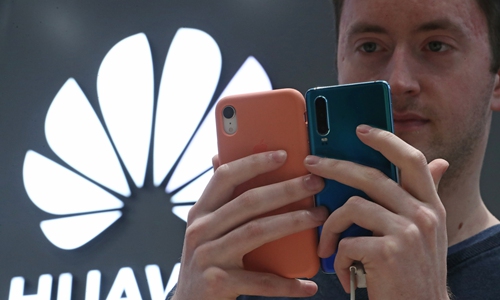HOME >> OPINION
US defines friends, enemies by support for Huawei 5G
By Zhang Yi Source:Global Times Published: 2020/2/17 20:57:27

A customer views smartphones in a Huawei store at the Aviapark shopping mall in Moscow on February 10, 2020. Huawei plans to invest $10 million in Russia to support the Huawei Mobile Services ecosystem. Photo: VCG
Australia and the UK are part of the Five Eyes intelligence alliance, which also includes the US, New Zealand and Canada. The latest fraternal tension came after the UK reportedly filed a complaint to Australia over leaked details of a recent meeting between UK Foreign Secretary Dominic Raab and some Australian MPs who questioned Rabb's decision to accept Huawei.
Since the start of the US crackdown on Huawei, the US has been bossy to its allies regarding their choice of companies in developing their 5G networks.
Canberra, a loyal follower of Washington, has banned Huawei from building its next-generation mobile internet networks, but London in January ignored US pressure by allowing Huawei in.
A queer phenomenon is taking place that the US-led Western camp is divided by Huawei supporters and opponents, and the US defines its friends or enemies with Huawei as a benchmark. US pressure tactics include warnings or even threats that nations adopting Huawei equipment would risk their US intelligence-sharing relationship and transatlantic values. As US Defense Secretary Mark Esper put it at the Munich Security Conference over the weekend, reliance on Chinese 5G vendors could jeopardize critical systems of US partners.
One of the reasons of the US saber-rattling is that there is no American 5G equipment supplier that can compete with Huawei, so the US can only resort to pressuring and threatening its allies to contain the Chinese high-tech company, which, however, goes contrary to the US free market doctrine.
Over Huawei, the US has made not just one contradicting move. At the Munich Security Conference, US House Speaker Nancy Pelosi made the Huawei issue a moral one by saying working with Huawei is like "choosing autocracy over democracy." But most US allies wouldn't forget how this superpower is eroding its moral authority through coercion.
In a world where the interests of countries are so interconnected and converged, it is in their best interests that countries remain independent instead of picking a side when developing relations with major powers. Sacrificing this independence to curry favor from the US is nothing but a self-misleading mind-set.
As for the feud between the UK and Australia, perhaps the US will find itself in a logjam as it has to use rhetoric to comfort each other.
Posted in: OBSERVER